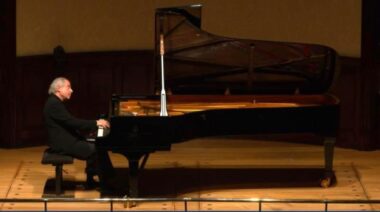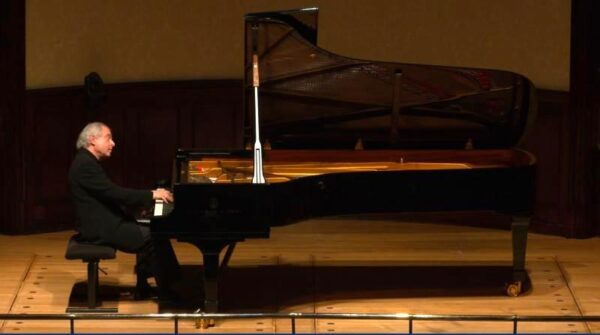 United Kingdom JS Bach, Beethoven: András Schiff (piano). Wigmore Hall, London, 22.5.2023. (CSa)
United Kingdom JS Bach, Beethoven: András Schiff (piano). Wigmore Hall, London, 22.5.2023. (CSa)

JS Bach – Ricercare from The Musical Offering, BWV 1079; Two-Part Inventions, BWV 772-801; 4 Duets (Clavier-Übung Part III) BWV 802-805
Beethoven – Sonata in C major Op.53, ‘Waldstein’ (played twice)
There are not many classical musicians today who are capable of attracting a capacity crowd to a London concert hall on an average Monday night, while keeping the programme a strict secret. One of the few who can be guaranteed to fill an auditorium to the rafters is Hungarian-born Sir András Schiff, the world-renowned pianist and pedagogue, whose masterful keyboard performances and erudite platform commentaries combine to surprise, educate and delight. Schiff’s latest and keenly anticipated Wigmore Hall recital fulfilled every promise. Audience speculation was heightened by the unexplained presence of two pianos on the stage. The Hall’s familiar 1970s Steinway Grand, affectionately known as ‘The Old Lady’, was instantly recognisable, but the second smaller one, a magnificent fortepiano veneered in walnut, proved more difficult to identify. A little research has revealed it to be a modern replica of an early Romantic instrument by Conrad Graf (c.1819), manufactured by the esteemed instrument maker Paul McNulty, in his workshop in Divisov, Czechoslovakia.
Schiff greeted concertgoers with his customary beatific smile and a series of deep bows, his hands characteristically pressed together in a Namaste gesture of welcome. He immediately took his seat at the Steinway and began his recital with a remarkable performance of the Ricecare from Bach’s Musical Offering. This monumental six-part fugue was based on a theme composed by the very musical Frederick the Great of Prussia, who also commissioned the work. Some believe that the King may have presented the theme as a practical joke, in the belief that it would have been impossible, even for Bach, to build a fugue of such complexity upon it. Considered by many to be one of the most difficult compositions of all time, Schiff’s mastery was absolute. Combining a perfect command of the intricate counterpoint, with crystalline clarity of expression and a finely nuanced dynamic range, Schiff’s exposition was technically perfect but never academic. This was an emotionally articulate performance filled with tenderness and humanity.
All 15 of the Two-Part Inventions, written by Bach as a model of extemporisation for his children, occupied the next part of the programme. Schiff, microphone in hand, confided that György Kurtág had instructed him to regard each piece as a complete work in itself. ‘Remember to play cantabile and not percussively. If you hit the piano, it hits you back’. Schiff gave an unblemished account, a faithful but free-spirited rendition which was alive to every change of mood. Tempos were infinitely varied; notes were perfectly observed, and the phrasing was beautifully shaped and contoured. ‘I have not once used the sustaining pedal’ Schiff confessed later. ‘Sonority must not come at the expense of counterpoint and clarity.’ Nonetheless, Schiff made the Wigmore Hall’s Steinway sing.
A sharp, anticipatory intake of breath could be heard when Schiff announced that the next piece on the programme was to be Beethoven’s Sonata in C major, the ‘Waldstein’. It is always safer to inhale than to cough at a Schiff recital, or one runs the risk of a Dame Edna Everage-style humiliation. ‘Would you like a glass of water? Or would you prefer to carry on coughing?’ he asked one mortified member of the audience, before returning to his subject. ‘The “Waldstein” is one of Beethoven’s greatest works and an undisputed masterpiece’ he declared. Every justification, then, to hear it played before the interval on the Steinway, and again after the interval on Paul McNulty’s fortepiano. ‘It will be a wonderful shock’ promised Schiff, ‘I want you to get used to a very different soundworld.’ His performance of the sonata on the ‘Old Lady’ was simply magnificent. Fusing sumptuous grandeur with edgy vehemence, he captured the drama and urgency of Beethoven’s obsessively repeated chords in the opening movement while passages of exquisitely executed ornamentation cascaded like water. Schiff’s suspenseful, mysterious take on the slow movement Introduzione ushered in a final and energetic Adagio: a boisterous peasant dance in which the pianist’s dexterous left thumb slid up and down the length of the keyboard in a series of jaw-dropping glissandi.
The second part of the concert featured two main works played on the fortepiano: Four Duets (Clavier-Übung Part III), and, as promised, a startlingly different account of the ‘Waldstein’.
The 4 Duets (Clavier-Übung), or practice pieces, refer to ‘duets’ but were written by Bach for one player with two voices, and were intended to teach students the art of counterpoint and keyboard agility. Although the Four Duets appear beguilingly simple, each is a complex masterpiece in chromatic construction, as demonstrated by Schiff’s performance. This was a dazzling display of technical skill and textural clarity, considerably enhanced by the soft and subtle tone of McNulty’s period instrument.
Could it be said that Schiff’s equally accomplished second time account of the ‘Waldstein’ sounded better on the fortepiano than on a contemporary concert grand? Schiff warned that we would have to adjust our expectations and were likely to be divided in our response. There were undoubtedly advantages to hearing the sonata on a replicated instrument of the period: the sound is certainly more intimate; ornamental passages can be played with greater delicacy; the opening passages of each movement are marked triple pianissimo and can be more faithfully and authentically reproduced. There is also the curious satisfaction of hearing the piece as it may have sounded to a nineteenth-century Viennese audience. On the other hand, some may argue that the full-bodied symphonic heft of the work was absent, and the drama which present-day audiences have come to expect was thereby diminished. There is bound to be controversy as to which version sounded best, but in matters of personal taste there can be no resolution. The purpose of a Schiff lecture/recital is not to provide answers but to ask questions; to surprise, stimulate and educate his audience, while delighting them with his brilliant and illuminating playing. He succeeded on both counts. A delightful encore, Beethoven’s Bagatelle Op.126, (No.4) rounded off an unforgettable evening.
Chris Sallon
